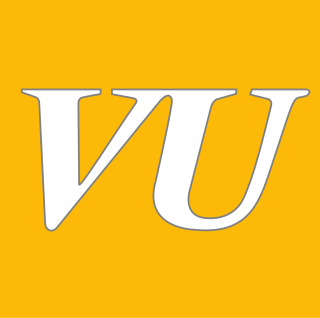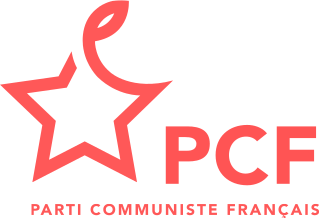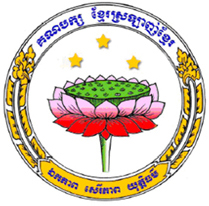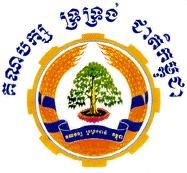Right-wing politics describes the range of political ideologies that view certain social orders and hierarchies as inevitable, natural, normal, or desirable, typically supporting this position based on natural law, economics, authority, property or tradition. Hierarchy and inequality may be seen as natural results of traditional social differences or competition in market economies.

People's Union was a Flemish nationalist political party in Belgium, formed in 1954 as a successor to the Christian Flemish People's Union.

The French Communist Party is a political party in France which advocates the principles of communism. The PCF is a member of the Party of the European Left, and its MEPs sit with the The Left in the European Parliament – GUE/NGL group.
The left–right political spectrum is a system of classifying political positions, ideologies and parties, with emphasis placed upon issues of social equality and social hierarchy. In addition to positions on the left and on the right, there are centrist and moderate positions, which are not strongly aligned with either end of the spectrum.

The Party of the Democratic Revolution is a social democratic political party in Mexico. The PRD originated from the Democratic Current, a political faction formed in 1986 from the Institutional Revolutionary Party (PRI). The PRD was formed after the contested general election in 1988, which the PRD's immediate predecessor, the National Democratic Front, believed was rigged by the PRI. This sparked a movement away from the PRI's authoritarian rule.

The Greens is a political party in Poland.
The Nouvelle Droite, sometimes shortened to the initialism ND, is a far-right political movement which emerged in France during the late 1960s. The Nouvelle Droite is at the origin of the wider European New Right (ENR). Various scholars of political science have argued that it is a form of fascism or neo-fascism, although the movement eschews these terms.

The National Democratic Institute (NDI), or National Democratic Institute for International Affairs, is a non-profit American NGO that works with partners in developing countries to increase the effectiveness of democratic institutions. Its stated mission is to "support and strengthen democratic institutions worldwide through citizen participation, openness and accountability in government."
Centre-right politics lean to the right of the political spectrum, but are closer to the centre. Parties of the centre-right generally support liberal democracy, capitalism, the market economy, private property rights, and a modest welfare state. They support conservatism and economic liberalism and oppose socialism and communism.

Right-wing populism, also called national populism and right-wing nationalism, is a political ideology that combines right-wing politics and populist rhetoric and themes. Its rhetoric employs anti-elitist sentiments, opposition to the Establishment, and speaking to or for the "common people". Recurring themes of right-wing populists include neo-nationalism, social conservatism, economic nationalism and fiscal conservatism. Frequently, they aim to defend a national culture, identity, and economy against perceived attacks by outsiders.
The Democratic Party of the United States is a big tent party composed of various factions. The four most prominent modern factions are the liberals, moderates, progressives, and conservatives. The liberal faction supports modern liberalism and social liberalism that began with the New Deal in the 1930s and the Great Society in the 1960s. The moderate faction supports Third Way politics that includes center-left social policies and center-right fiscal policies. The progressive faction supports social democracy and left-wing populism. The conservative faction supports centre-right policies. The traditional conservative Democratic faction lost much of its influence in the 21st century as the South realigned towards the Republican Party, though a subsequent realignment starting in the 2010s brought a new set of moderate to conservative voters disillusioned with Trumpism in the Republican Party, prominently including many suburban women, into the Democratic tent.
Pen Sovan was a Cambodian politician and revolutionary who served as the Prime Minister of the Hanoi-backed People's Republic of Kampuchea from 27 June to 5 December 1981. He also served as General Secretary of the Kampuchean People's Revolutionary Party (KPRP) from 1979 to 1981. He was arrested and removed from office in December 1981 by the Vietnamese for irritating Lê Đức Thọ, the chief adviser to the PRK government. He was imprisoned in Vietnam until January 1992.

American political ideologies conventionally align with the left–right political spectrum, with most Americans identifying as conservative, liberal, or moderate. Contemporary American conservatism includes social conservatism, classical liberalism and economic liberalism. The former ideology developed as a response to communism and the civil rights movement, while the latter two ideologies developed as a response to the New Deal. Contemporary American liberalism includes progressivism, welfare capitalism and social liberalism, developing during the Progressive Era and the Great Depression. Besides modern conservatism and liberalism, the United States has a notable libertarian movement, and historical political movements in the United States have been shaped by ideologies as varied as republicanism, populism, separatism, socialism, monarchism, and nationalism.

Khmer Loves Khmer Party is a Cambodian Political Party founded in 2008. It believes in democracy and ideas like in its slogan "Unity, Liberty and Justice". Therefore, its political position has broadened and represents many ideologies like some of the liberal oriented ideology since it believes in not big but smaller government can create “Significant changes and results can be obtained through smaller government”, helping to create changes and results from all the individuals that make up Cambodian society. The idea of people also having the "freedom of choice" in their lives means they can choose anything like food, healthcare, politics etc. which is a value of the KLKP's liberal ideology.

The Khmer Republican Party (KRP) is political party created on 11 March 2006. It participated in the 27 July 2008 elections under the leadership of Lon Rith.

The Khmer Neutral Party is a political party in Cambodia. It has its headquarters in Kampong Chhnang.

The Hang Dara Democratic Movement Party is a Cambodian political party whose leader was Hang Dara. It was created in May 2002.
The Cambodian Center for Human Rights is a non-partisan, independent, non-governmental organization that works to promote and protect democracy and respect for human rights throughout Cambodia. It focuses primarily on civil and political rights and on a variety of interlinked human rights issues. The white bird flying out of a circle of sky blue on the logo of the organization symbolizes Cambodia’s quest for freedom.

The Cambodia National Rescue Party was a major political party in Cambodia. It was founded in 2012 as a merger between the Sam Rainsy Party and Human Rights Party.
Centre-left politics is the range of left-wing political ideologies that lean closer to the political centre. Major ideologies of the centre-left include social democracy, social liberalism and progressivism. Ideas commonly supported by the centre-left include welfare capitalism, social justice, liberal internationalism, and multiculturalism. Economically, the centre-left supports a mixed economy in a democratic capitalist system, often including economic interventionism, progressive taxation, and the right to unionize. Centre-left politics are contrasted with far-left politics that reject capitalism or advocate revolution.















